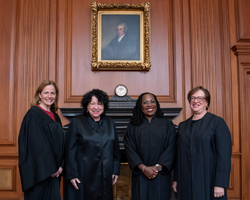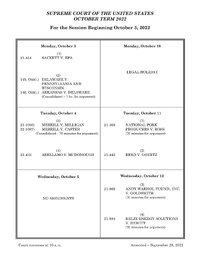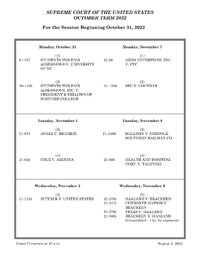PPEcel
cope and seethe
★★★★★
- Joined
- Oct 1, 2018
- Posts
- 29,087

The 2022-2023 U.S. Supreme Court term is, well, unique. For the first time in American history, there are four femoids on the Court—Sotomayor, Kagan, Barrett, and Jackson. Ordinarily, that would be cause for dismay. But the Court has recently shown a willingness to return to a principled reading of the Constitution, no matter the whining from the extremist left. As the Wall Street Journal’s Editorial Board aptly described it, “The Court’s jurisprudence is focused more than anything else on who under the Constitution gets to decide policy, not what that policy should be.”
I mean, let’s take a second to appreciate some of the U.S. Supreme Court’s accomplishments last term. In 2021-2022, the Based Court:
- Blocked emotional distress torts from federal anti-discrimination laws in Cummings v. Premier Rehab Keller, limiting payouts that victims of sexual assault can receive from colleges and employers;
- Struck down Section 304 of the Bipartisan Campaign Reform Act of 2002 in FEC v. Ted Cruz for Senate, holding that limits on the use of post-election campaign contributions violates the First Amendment;
- Expanded Second Amendment rights in New York State Rifle and Pistol Association v. Bruen, striking down “may-issue” concealed carry licensing regimes;
- Strengthened the major questions doctrine of administrative law and narrowed the scope of Chevron deference in West Virginia v. Environmental Protection Agency, curtailing the EPA’s authority to regulate carbon emissions;
- Unanimously ruled in favor of doctors accused of illegally prescribing opioids in Ruan v. United States, requiring prosecutors to prove subjective intent of wrongdoing;
- Returned the abortion question to the states in Dobbs v. Jackson Women’s Health Organization, overturning Roe and Casey.


SCOTUS Argument Calendar for October and November 2022
So what’s on the docket this term? Admittedly, it’s hard to see how any of these cases could top the drama of Dobbs, but here are some of the upcoming blockbusters:
Merrill v. Milligan
Oral argument: Oct. 4th, 2022
Lower court: U.S. District Court, Northern District of Alabama
Section 2 of the Voting Rights Act of 1965 prohibits states from adopting election practices that “result in a denial or abridgement of the right to vote based on race”. After the 2020 census, Alabama drew a redistricting map where only one out of seven congressional districts were majority-black, even though blacks account for 27% of the state’s population. The Court will now consider whether this constitutes illegal racial gerrymandering in violation of the Voting Rights Act.
Students for Fair Admissions v. Harvard College
Oral argument: Oct. 31st, 2022
Lower court: U.S. Court of Appeals, First Circuit
In Grutter v. Bollinger (2003), the U.S. Supreme Court held that the use of race in admissions decisions was legal, as doing so furthered a compelling interest in “obtaining the educational benefits that flow from a diverse student body”. Twenty years later, the Court will revisit this decision to determine whether Harvard College violates Title VI of the Civil Rights Act of 1964 by penalizing Asian-American applicants. Justice Jackson will recuse herself from this case because of her ties to Harvard University.
Students for Fair Admissions v. University of North Carolina
Oral argument: Oct. 31st, 2022
Lower court: U.S. District Court, Middle District of North Carolina
This is the second affirmative action case the Court will hear this term, and differs slightly from SFFA v. Harvard in that UNC is a state university; whereas Harvard is a private university. Here, the Court will also revisit Grutter v. Bollinger (2003), and determine whether UNC violates the Equal Protection Clause of the Fourteenth Amendment by rejecting race-neutral alternatives to affirmative action.
303 Creative LLC v. Elenis
Oral argument: Not yet scheduled
Lower court: U.S. Court of Appeals, Tenth Circuit
The Free Speech Clause of the First Amendment not only protects the right to speak, but also the right to not be forced to speak. This is known as the compelled speech doctrine. Lorie Smith is a website designer in Colorado who opposes same-sex marriage and does not wish to create wedding websites for same-sex couples. However, Colorado’s public accommodations law bars discrimination on the basis of sexual orientation. The Court will consider whether, as applied, the Colorado law violates Smith’s First Amendment rights.
Moore v. Harper
Oral argument: Not yet scheduled
Lower court: Supreme Court of North Carolina
This is a test of the “independent state legislature theory.” The Election Clause of Article I, Section 4 of the Constitution says that “The Times, Places and Manner of holding Elections for Senators and Representatives, shall be prescribed in each State by the Legislature thereof.” To this end, the Court will consider the degree to which state courts can modify or nullify election regulations set by state legislatures. Should the Court upend constitutional law by adopting the “independent state legislature theory,” this would very substantially increase conservative influence over federal elections, as the Republican Party is dominant in most state legislatures.
So, yes, there is plenty for them to seethe about.
There are also some other cases worth watching. Each year, the U.S. Supreme Court hears less than 2% of all the cases that are appealed to them. These are eight cases that still pending certiorari that I think are potentially important; covering free speech, the internet, gun control, and femoids’ rights.
Notable petitions for certiorari:
- Counterman v. Colorado (First Amendment, true threats)
- United States v. Hansen (First Amendment, encouragement or incitement of illegal activity)
- Moody v. NetChoice, LLC (First Amendment, social media censorship)
- Gonzalez v. Google, LLC (Section 230, terrorism)
- Twitter, Inc. v. Taamneh (Justice Against Sponsors of Terrorism Act)
- University of Toledo v. Wamer (Title IX, sexual assault)
- Gun Owners of America v. Garland and Aposhian v. Garland (Chevron deference, bump stocks)
i rushed this post just now so hopefully no typos yeah





